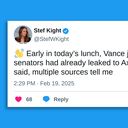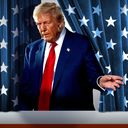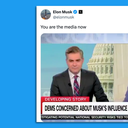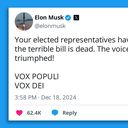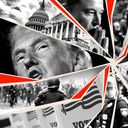Jim VandeHei: Axios coverage in Trump era
Axios CEO Jim VandeHei wrote this column for Finish Line, our evening newsletter:
We're flooded with reader feedback on covering politics in this wild era. It ranges from calling me a "Beta Soy Boy" who should have been aborted to a soulless suck-up, wittingly enabling tyranny.
- I can confidently say: The truth sits in between!
Why it matters: Here's the shocker: Most people, even caustic critics, ask thoughtful questions about why and how we do what we do in terms of our coverage. This Finish Line is my stab at demystifying it a bit.
Our North Star: Readers first.
- Those were the first two words of our Axios Manifesto nearly eight years ago, and they've shaped every tough decision ever since. It's a great gut check: What helps our readers get smarter, faster on the most consequential topics?
This star led us to break with most traditional media companies on three important points:
- No editorial page, ever. Opinion pieces drive a lot of traffic — and therefore a lot of ad revenue and subscribers — for our competitors. But we felt it was confusing for readers to have to differentiate between an opinion piece and a serious news piece emanating from the same institution. So we have no opinion section.
- No popping off on social media. We ask anybody who works for Axios, whether they're on the editorial side or any other part of the business, not to express their political leanings in public settings, including social media. We felt this was one small step to persuade the persuadables that we're trying to get to the closest approximation of the truth without putting our thumbs on the scale. We're imperfect but quite good on this score.
- Smart BREVITY. We ask every reporter to fully buy into both the "Smart" and "Brevity" parts of our journalism. This is designed to be respectful of your time and intelligence. It's a big differentiator from more traditional media companies. We put every new writer and editor through a Smart Brevity Boot Camp to get this right.
This new environment is different in two substantial ways:
1. Fragmentation. We've written extensively about how all of us are breaking off into different information ecosystems based on age, interests, politics and jobs. This means Axios needs to deepen its relationship with our core readers AND look for new ways to engage open-minded readers elsewhere.
- One example: Posting our stories aggressively on X. Elon Musk and I had a spirited exchange about the value of traditional reporting. (I inalterably support it. He's inalterably skeptical of traditional media.) But Axios wants our content where smart, curious readers congregate — and X is inarguably the top platform for tens of millions of them.
2. War on media. Truth is, President Trump consumes and talks to legacy media more than any president we can think of. Trump will do more press avails in a month than President Biden did in a year. Axios' Zachary Basu traveled with Defense Secretary Pete Hegseth on last week's Europe swing.
- But Trump and his allies are suing media companies over coverage, freezing out AP from covering him inside the Oval Office or Air Force One, and suspending subscriptions to many publications. So it gets tense.
We signed a letter protesting Trump's decision to bar AP reporters from the Oval Office and Air Force One, after the newswire's style guidelines stuck with calling it the Gulf of Mexico rather than Trump's renamed Gulf of America. We simply think neither party should bully a free media over its words or stories. We also believe it's unwise and dangerous not to confidently allow seasoned reporters access. Both parties should invite serious scrutiny: It makes your ideas, and the country, stronger.
- But in general, Axios will speak for Axios. We aren't legacy media — in fact, we bolted legacy media to start new companies for a new era. We cherish our relationship with you, the reader, and will be transparent with you on controversial topics. It's in our DNA.
- Some of you were pissed that we broke with AP on the actual Gulf debate. Our style is "Gulf of America (renamed by the U.S. from Gulf of Mexico)." Critics saw this as caving into the White House. But to us, it was easy to simply follow the North Star of being reader-first. If you go to Google Maps, Apple Maps or government websites, that body of water is called Gulf of America. So we just give the exact state of play without putting on the jersey of one side or the other.
What to expect from Axios: We'll cover every topic — from Trump to AI — clinically and unemotionally, like a doctor. We simply want to give you the facts and insights to make better decisions and live better lives.
Our ask: Don't assume every story we write or decision we make is because we're morons or corrupt or MAGA lovers or liberal lovers. Just ask. We try to respond to every email. If you hit our publisher, Nick Johnston ([email protected]) about any of our policies, I guarantee you a timely response.
- Keep the feedback coming: [email protected]. But go light on the Soy Boy crap.


